新概念2 第67课 ppt课件
- 格式:ppt
- 大小:3.42 MB
- 文档页数:9
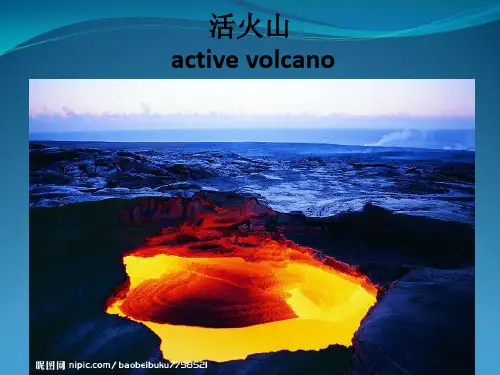
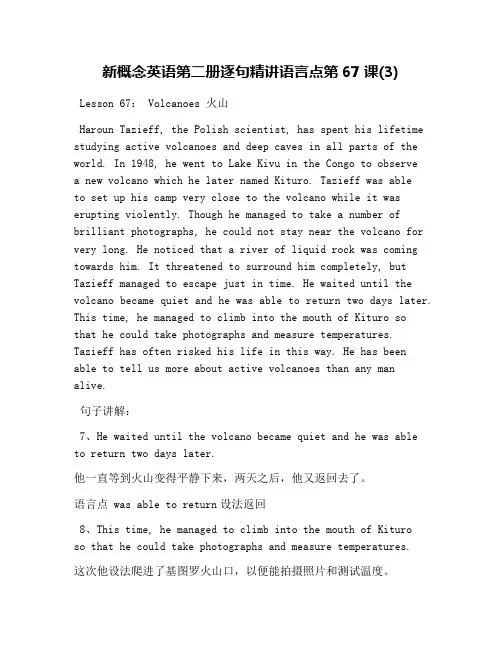
新概念英语第二册逐句精讲语言点第67课(3)Lesson 67: Volcanoes 火山Haroun Tazieff, the Polish scientist, has spent his lifetime studying active volcanoes and deep caves in all parts of the world. In 1948, he went to Lake Kivu in the Congo to observea new volcano which he later named Kituro. Tazieff was ableto set up his camp very close to the volcano while it was erupting violently. Though he managed to take a number of brilliant photographs, he could not stay near the volcano for very long. He noticed that a river of liquid rock was coming towards him. It threatened to surround him completely, but Tazieff managed to escape just in time. He waited until the volcano became quiet and he was able to return two days later. This time, he managed to climb into the mouth of Kituro sothat he could take photographs and measure temperatures. Tazieff has often risked his life in this way. He has beenable to tell us more about active volcanoes than any man alive.句子讲解:7、He waited until the volcano became quiet and he was ableto return two days later.他一直等到火山变得平静下来,两天之后,他又返回去了。
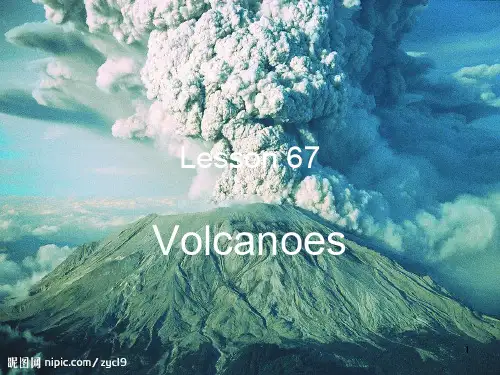
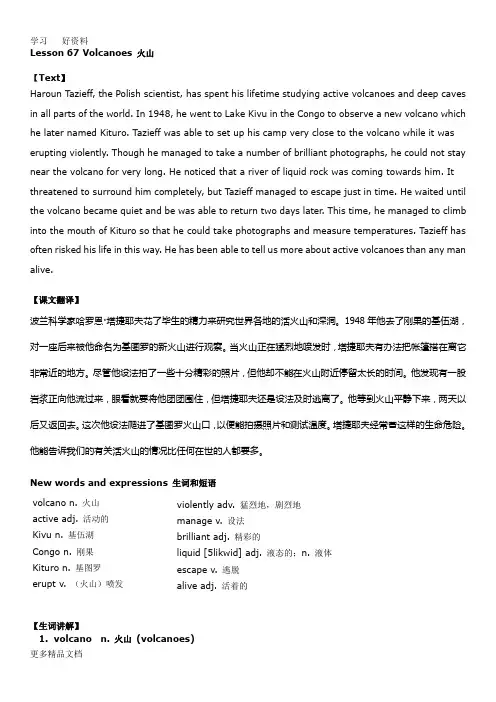
Lesson 67 Volcanoes 火山【Text】Haroun T azieff, the Polish scientist, has spent his lifetime studying active volcanoes and deep caves in all parts of the world. In 1948, he went to Lake Kivu in the Congo to observe a new volcano which he later named Kituro. Tazieff was able to set up his camp very close to the volcano while it was erupting violently. Though he managed to take a number of brilliant photographs, he could not stay near the volcano for very long. He noticed that a river of liquid rock was coming towards him. It threatened to surround him completely, but T azieff managed to escape just in time. He waited until the volcano became quiet and be was able to return two days later. This time, he managed to climb into the mouth of Kituro so that he could take photographs and measure temperatures. Tazieff has often risked his life in this way. He has been able to tell us more about active volcanoes than any man alive.【课文翻译】波兰科学家哈罗恩·塔捷耶夫花了毕生的精力来研究世界各地的活火山和深洞。
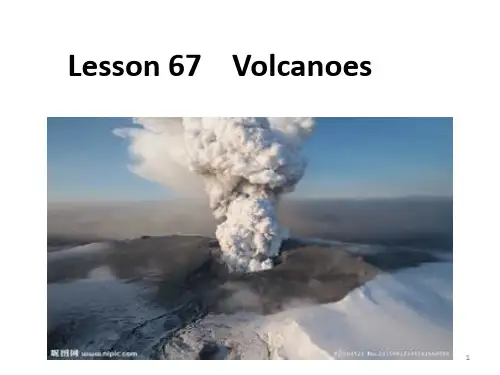
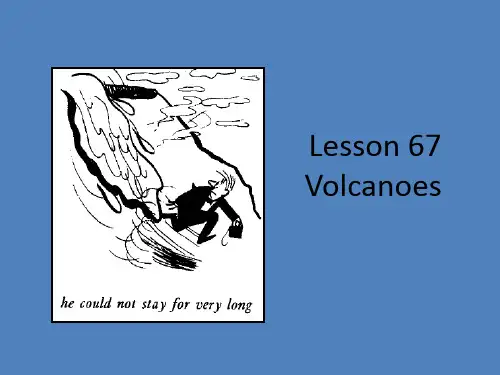
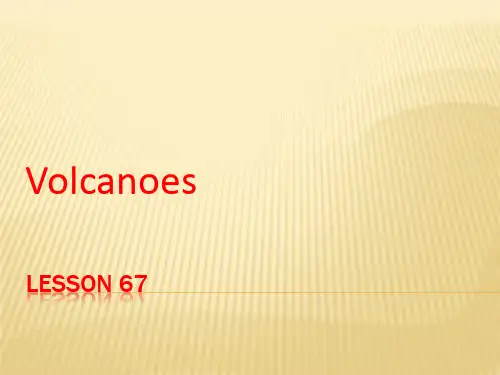
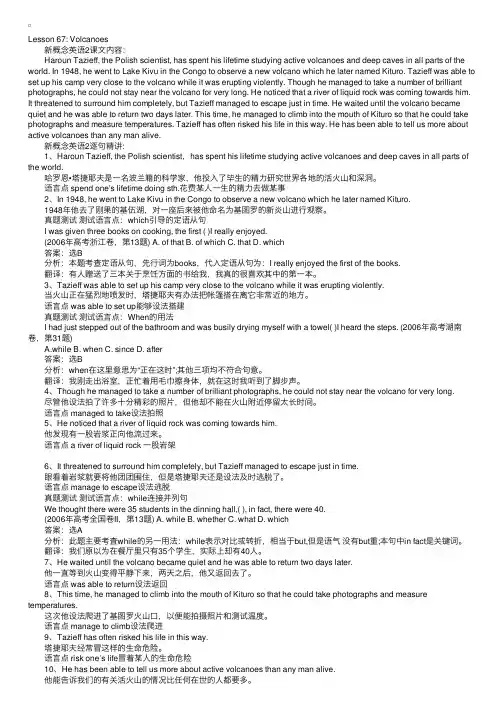
Lesson 67: Volcanoes 新概念英语2课⽂内容: Haroun Tazieff, the Polish scientist, has spent his lifetime studying active volcanoes and deep caves in all parts of the world. In 1948, he went to Lake Kivu in the Congo to observe a new volcano which he later named Kituro. Tazieff was able to set up his camp very close to the volcano while it was erupting violently. Though he managed to take a number of brilliant photographs, he could not stay near the volcano for very long. He noticed that a river of liquid rock was coming towards him. It threatened to surround him completely, but Tazieff managed to escape just in time. He waited until the volcano became quiet and he was able to return two days later. This time, he managed to climb into the mouth of Kituro so that he could take photographs and measure temperatures. Tazieff has often risked his life in this way. He has been able to tell us more about active volcanoes than any man alive. 新概念英语2逐句精讲: 1、Haroun Tazieff, the Polish scientist,has spent his lifetime studying active volcanoes and deep caves in all parts of the world. 哈罗恩•塔捷耶夫是⼀名波兰籍的科学家,他投⼊了毕⽣的精⼒研究世界各地的活⽕⼭和深洞。
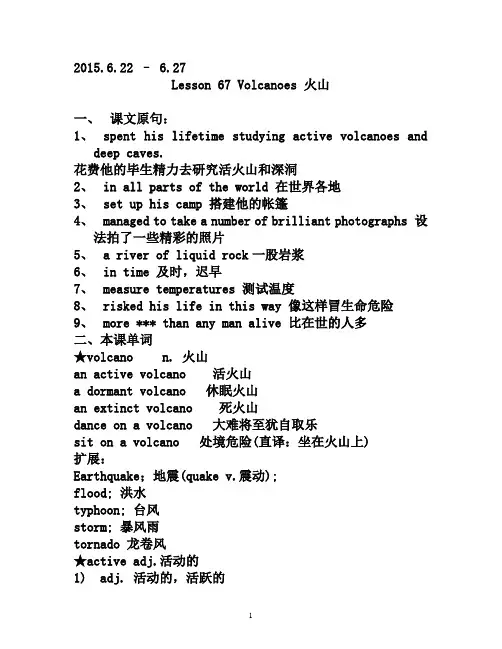
2015.6.22 – 6.27Lesson 67 Volcanoes 火山一、课文原句:1、spent his lifetime studying active volcanoes anddeep caves.花费他的毕生精力去研究活火山和深洞2、in all parts of the world 在世界各地3、set up his camp 搭建他的帐篷4、managed to take a number of brilliant photographs 设法拍了一些精彩的照片5、 a river of liquid rock一股岩浆6、in time 及时,迟早7、measure temperatures 测试温度8、risked his life in this way 像这样冒生命危险9、more *** than any man alive 比在世的人多二、本课单词★volcano n. 火山an active volcano 活火山a dormant volcano 休眠火山an extinct volcano 死火山dance on a volcano 大难将至犹自取乐sit on a volcano 处境危险(直译:坐在火山上)扩展:Earthquake;地震(quake v.震动);flood; 洪水typhoon; 台风storm; 暴风雨tornado 龙卷风★active adj.活动的1) adj. 活动的,活跃的Eg:an active member of the club2) adj. 积极的;主动的Eg:an active learnerEg:take active stepsEg:active vioceEg:take an active part in the activities反义词 passive adj. 消极的, 被动的an passive learnerpassive vioce★Kivu n.基伍湖★Congo n. the Congo 刚果★Kituro n.基图罗★erupt v.(火山)喷发★violently adv. 猛烈地, 剧烈Eg:She shook her head violently.Eg:The volcano violently erupted.•violent adj. 猛烈的, 激烈的, 暴力引起的, 强暴a violent man 暴徒•violence n. 猛烈, 强烈, 暴力, 暴虐, 暴行, 强eg:They threaten me with violence.★manage v. 设法 (manager)•固定搭配 manage to do sth. 设法做成某事•= succeed in doing sth.•=was able to do sth.Eg:我能把这件事办好I can manage it.= I can manage it myself.= I can do it.Eg:我总算下了车.I managed to get off the bus.Eg:那栋房子你最后找到了没有?Did you manage to find the house?★brilliant adj. 卓越的;非凡的;精彩的;有才华的;鲜明的a brilliant speaker 一位卓越的演说家a brilliant achievements 非凡的成就brilliant photos 精彩的照片a brilliant artist 有才华的艺术家a brilliant color 鲜艳的颜色★liquid adj.液态的★escape (run away)① vt. 逃脱escape death固搭escape doing sth. 逃脱做某事Eg:他逃过了惩罚。
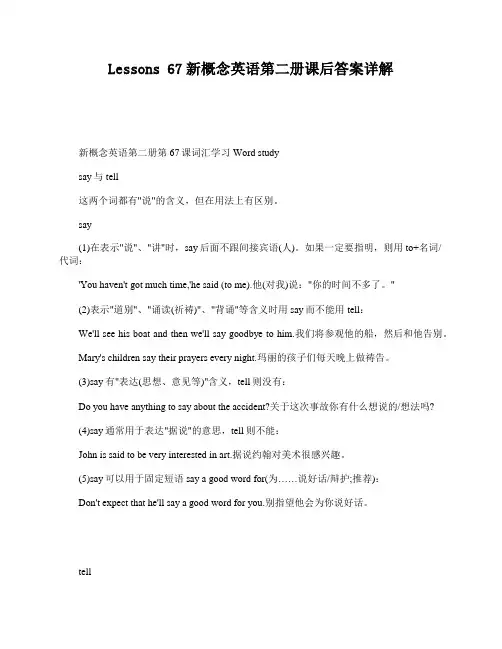
Lessons 67新概念英语第二册课后答案详解新概念英语第二册第67课词汇学习 Word studysay与tell这两个词都有"说"的含义,但在用法上有区别。
say(1)在表示"说"、"讲"时,say后面不跟间接宾语(人)。
如果一定要指明,则用to+名词/代词:'You haven't got much time,'he said (to me).他(对我)说:"你的时间不多了。
"(2)表示"道别"、"诵读(祈祷)"、"背诵"等含义时用say而不能用tell:We'll see his boat and then we'll say goodbye to him.我们将参观他的船,然后和他告别。
Mary's children say their prayers every night.玛丽的孩子们每天晚上做祷告。
(3)say有"表达(思想、意见等)"含义,tell则没有:Do you have anything to say about the accident?关于这次事故你有什么想说的/想法吗?(4)say通常用于表达"据说"的意思,tell则不能:John is said to be very interested in art.据说约翰对美术很感兴趣。
(5)say可以用于固定短语 say a good word for(为……说好话/辩护;推荐):Don't expect that he'll say a good word for you.别指望他会为你说好话。
tell(1)在表示"说"、"讲"时,tell后面可以跟双宾语:He told me/ said that he would be retiring.他告诉我/说他快要退休了。
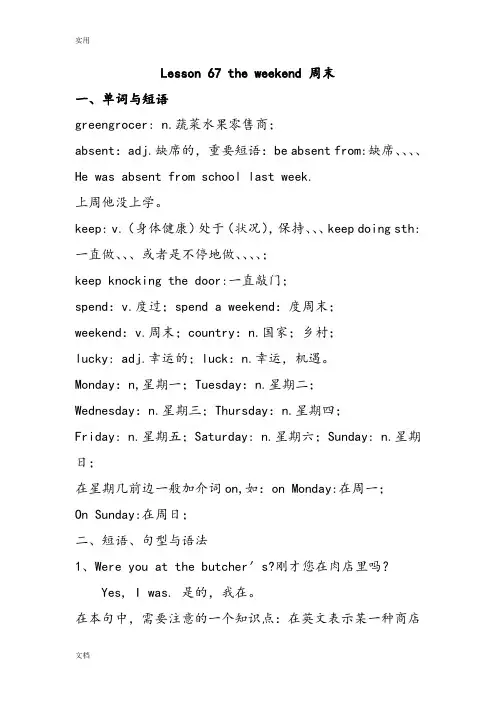
Lesson 67 the weekend 周末一、单词与短语greengrocer: n.蔬菜水果零售商;absent:adj.缺席的,重要短语:be absent from:缺席、、、、He was absent from school last week.上周他没上学。
keep: v.(身体健康)处于(状况),保持、、、keep doing sth:一直做、、、或者是不停地做、、、、;keep knocking the door:一直敲门;spend:v.度过;spend a weekend:度周末;weekend:v.周末;country:n.国家;乡村;lucky: adj.幸运的;luck:n.幸运,机遇。
Monday:n,星期一;Tuesday:n.星期二;Wednesday:n.星期三;Thursday:n.星期四;Friday: n.星期五;Saturday: n.星期六;Sunday: n.星期日;在星期几前边一般加介词on,如:on Monday:在周一;On Sunday:在周日;二、短语、句型与语法1、Were you at the butcher′s?刚才您在肉店里吗?Yes, I was. 是的,我在。
在本句中,需要注意的一个知识点:在英文表示某一种商店的短语中,shop这个词往往可以省略,如文中的the butcher′s 其实就是the butcher′s shop的省略,另外像文中的the greengrocer′s 其实就是 the greengrocer′s shop 的省略,另外的例子还有the hairdresser′s (shop )等等,shop 的省略不影响句义,就是一种表达的习惯。
2、how is jimmy today?吉米今天怎么样?在本句中我们继续复习关于询问人或事物状况的几个重要的句型:How is/are+主语、、、怎么样?例:How are you today?你今天可好?How is Tom today?汤姆今天可好?另外What is the matter with、、、?经常用来询问人和事物的状况,常作“是否有问题”“是否有麻烦讲”例如:What is the matter with Tom?汤姆怎么了啊?What is the matter with this bike?这辆自行车怎么了啊?What is the matter with the book?这本书怎么了?3、Was he absent from school last week?上周他没上学吧?在本句中需要掌握一个重点短语的用法:be absent from:缺席、、、例:He is absent from the meeting since he is ill.他今天缺席会议是因为他病了。